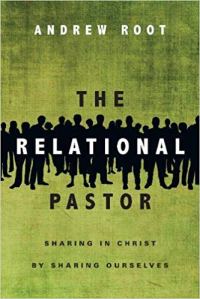In yesterday’s post, I pivoted from Yuval Levin’s discussion of institutional renewal to a question about renewal in the church. Levin spends a good bit of time talking about outsiders and insiders and how we need to see ourselves as insiders regardless of how we feel about our institutions. To do otherwise is to see institutions as platforms and not as molds.
Over the last few months, the writings of Andrew Root (associate professor of youth and family ministry at Lutheran Seminary) has been a good way for me to think/rethink some thoughts about the church. Because even though I’m something of an insider at church, I’m also a kind of outsider. I imagine people saying that I am outsider by choice, but a big part of that is because they have no interest in hearing my story or see me primarily as a cog in the programmatic wheel, a person to fill a slot. That probably sounds harsh, but it also rings true from experience.
+ + + + + + +
 Andrew Root begins The Relational Pastor in an interesting way: he admits to being an introvert, which colors the way he understands relationships. From the preface:
Andrew Root begins The Relational Pastor in an interesting way: he admits to being an introvert, which colors the way he understands relationships. From the preface:
I’ve come to recognize that the very fact that I possess this personal disposition gives me a perspective on the depth and mystery of relationships themselves. Because relationships are not a reflex for me, I’ve been forced to think deeply about them. And when reflecting on my own experience I’ve been overcome by a spiritual significance relationship has played in my life (even in the life of a TV-loving introvert). When I’m broken, afraid, and needing to celebrate, like an impulse I (again, the severe introvert) seek out others; I need others to share with me, to share in me. There is something about relationship that is deeper than the introvert-extrovert personal traits; there is something about the human spirit that yearns (needs at the deepest level) for others to share in our lives.
+ + + + + + + +
For some time now I’ve thought about how there’s a difference between being relational and having relationships. Being relational means that you are cordial, are friendly to others. It’s a kind of “Southern hospitality.” Having relationships, on the other hand, involves a commitment a step beyond kindness. Maybe the distinction isn’t that important to others, but it’s helped me think through some things. Rich Mullins said it this way in “Elijah”:
There’s people been friendly, but they’d never be your friend
and sometimes this has bent me to the ground.
I like that Root lays this kind of foundation for his book from the outset. Just because you’re an introvert doesn’t mean that relationships aren’t as important to you as they are to an extrovert. They may be more important (for good or bad) because they are hard fought/hard won. The difference is in obviousness. Those of us who walk the line between introversion and extroversion exist in an odd kind of no-man’s land, especially if you live far from the givens of family and long-term friendships. And those of us who are professionally in front of people all of the time can find ourselves in an uneasy spot between relationships with others.
Relationship is, of course, the way back in (even when you’re not really on the outside). And while the world of relationships can be a real minefield, it’s the ground that is necessary for us to traverse in order to find ourselves in a better place.
You can purchase Andrew Root’s The Relational Pastor here.





